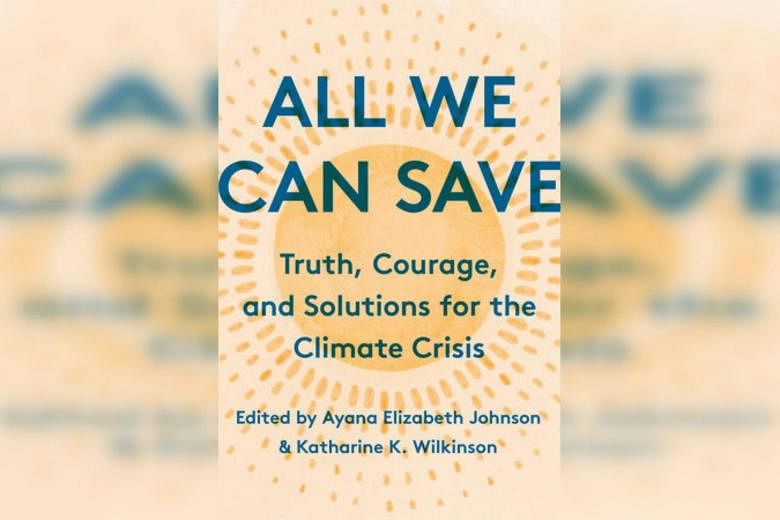Non-fiction
ALL WE CAN SAVE: TRUTH, COURAGE, AND SOLUTIONS FOR THE CLIMATE CRISIS
Edited by Ayana Elizabeth Johnson and Katharine K. Wilkinson
One World/Hardcover/419 pages/ $49.76/ Available here
3 out of 5
The climate crisis affects everyone, yet the figures dominating the conversation are mostly men.
This imbalance is what the collection All We Can Save seeks to rectify.
Editors Johnson and Wilkinson make this mission clear in their introductory note, drawing the link between conventionally patriarchal systems and the crisis.
"The climate crisis is not gender-neutral," they argue, and not recognising female action or leadership in the climate movement sets the world up for failure.
The anthology's contributors include journalists, activists, scientists, researchers, writers and artists - all of whom are women.
This means it contains not just essays, but also personal accounts, open letters and even poems. Many were repurposed from other publications or sites.
Those used to functionalist or expository non-fiction may find the shift between personal and academic voices jarring or haphazard.
But this, the editors argue, is a deliberate choice to show the nuanced responses and solutions to a mindbogglingly pervasive global problem.
Perhaps conventional gendered expectations of climate "science" are what should be questioned. Should not an understanding of the crisis also be deeply personal and emotional?
Indeed, one of the motifs of the book is that of questioning assumptions.

Writer and biologist Janine Benyus' essay, Reciprocity, contests the idea that plants compete with one another for resources, a "truth" based in seductive economic logic that has made it counter-intuitive to think that nature can work collaboratively.
Pieces by the likes of Native American lawyer Sherri Mitchell-Weh'na Ha'Mu Kwasset question the scientific origins of knowledge, arguing that indigenous wisdom forms a better basis for environmentalism.
These epistemological pieces are situated in the book's first section, Root, which the less philosophically inclined may wish to skip.
The succeeding sections offer solutions and actions. Mary Anne Hitt's Beyond Coal, for example, offers a practical, well-researched look at her work as an anti-coal activist in the United States.
Unfortunately, the piece also highlights a weakness throughout the anthology: For a book that claims everyone is needed in the movement to save the planet, all of its perspectives are American.
Johnson and Wilkinson provide the rather weak explanation that the US is the country most responsible for causing the climate crisis.
It seems more likely that views from the US were the easiest and most accessible for compilation.
Maggie Thomas' account, The Politics Of Policy, is the most obviously US-centric. It discusses her work as a climate policy adviser for US Senator Elizabeth Warren's presidential campaign.
Consequently, it reads like a Democratic Party campaign pitch, ending with: "Finally, Americans are seeing that this is our fight."
In a less direct way, climate scientist Katharine Hayhoe's How To Talk About Climate Change has a similar problem.
The sort of climate change denial she discusses seems overwhelmingly unique to the American sociopolitical context.
Some pieces are more relatable. In Litigating In A Time Of Crisis, Abigail Dillen discusses a universal feeling of anxiety and paralysis, illustrating the need for moral courage through the role model of her late mother, a trial lawyer.
Journalist Naomi Klein's accessible On Fire tackles a worldwide problem - that despite years of meetings on climate change, nothing seems to get done.
She ties together youth activism and the work of international bodies, outlining a specific solution - a global Green New Deal.
One sympathises with the urgency of bringing long-ignored female voices to the climate emergency discussion.
But the diversity of the book is both its greatest strength and weakness. The anthology tries to be too many things to too many people.
The good thing is that one does not have to read the book in sequence, but can pick and choose what to read and what to skip.
Perhaps All We Can Save falls short of expectations because it sets out to do so much for a phenomenon that is already inherently overwhelming.
Where the anthology has succeeded is in bringing together a broad range of untold, female perspectives, united by a common sense of urgency.
If you like this, read: Eating Chilli Crab In The Anthropocene, edited by Matthew Schneider-Mayerson (Ethos Books, 2020, $25, available here), a collection of Singapore perspectives on the environment, from the ecological cost of chilli crab to the orang minyak (oily man) of Malay folklore as "petrohorror".

